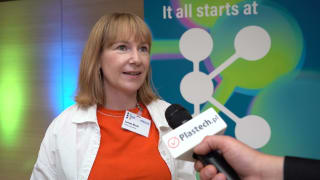Sound expertise: KHS specialists have been studying rPET since 2012
The KHS Group has also been examining the use of recyclate for some time now – in fact since 2012. KHS’ Bottles and Shapes™ service program focuses on the practical application thereof on the stretch blow molders and indeed all of the filling and packaging lines engineered by the Dortmund systems supplier. “We run tests to qualify recycled PET so that we can tell our customers in advance which impact the material will have on the blow molder and bottle quality,” says Arne Wiese, product manager for Bottles & Shapes™ at KHS Corpoplast. The aim to be able to quantify the various different qualities.
In doing so, KHS must work closely with preform manufacturers. They are ultimately often the companies which subject the washed PET flakes or rPET granulate to further thermomechanical processing and prepare them for injection molding. “We’re consulting with all of the major plastics processors in Europe on this topic,” Wiese emphasizes. And that is not all; KHS is also liaising with various engineering companies on preform manufacture. Thanks to this close cooperation, data from the injection molding process can be used just in time to adapt the stretch blow molding process. This makes bottle production faster and more efficient and improves the quality of the finished containers.
Adaptations needed: KHS has the right systems
“With recyclate the color can vary from batch to batch, for instance,” is how Wiese outlines one of the challenges faced. “Darker material absorbs heat better. The lower heating capacity requires less energy. This makes production more efficient yet means that adaptations must be made to the blow molding program on the stretch blow molder.” It is therefore essential that the effects are quantified, he continues. Another challenge is the intrinsic viscosity. “The longer the recyclate is boiled under vacuum, the longer the polymer chains become. This means that the intrinsic viscosity increases and the quality improves. However, this results in additional costs which not everyone is prepared to invest,” Wiese adds. “Here, we have to come up with ways of redistributing the material from uncritical areas – the bottle base in the case of still water – to more critical zones.” Experience shows that manufacturers of premium brands – whose containers have thicker walls – have less cause for adjustment than discounters, where all of the lightweighting options have often been exhausted. This is where recyclate can reach its limits.
In this context a technology developed by KHS in cooperation with inspection technology manufacturer Agr International scores points: Unit Mold Control, a digital, automated control system which regulates the blow stations on the InnoPET Blomax individually. It helps to control material distribution more precisely, reduces variations in the wall thickness by up to 30% and lessens any fluctuations in quality during stretch blow molding. “This is especially relevant when using recycled PET,” explains Frank Haesendonckx, head of Technology at KHS Corpoplast. “Here, the quality of the material can vary, meaning that the lower the preform weight, the greater the fluctuations in material in the bottle and the more unstable it becomes.” During continuous wall thickness inspection the new system identifies any unwanted material displacement and automatically counteracts this, states Haesendonckx. “Unit Mold Control combines weight reduction with bottle stability and is thus one of the many sustainable and effective answers KHS has to the challenges thrown up by the current packaging debate.”
According to Bottles & Shapes™ expert Arne Wiese there are no convincing arguments against the use of recycled PET in beverage bottles. The only relevant difference he sees between virgin PET and recycled material is the slightly darker color. This is a question of sorting, however – and only really visible in water bottles. With other beverages, such as the Beyond Juice bottle developed by KHS which is made entirely of recyclate, the consumer would not even notice the difference once the bottle is filled. As far as the mechanics are concerned, there is nothing to stop companies converting to rPET, providing ideal conditions for the creation of a functioning circular economy.



